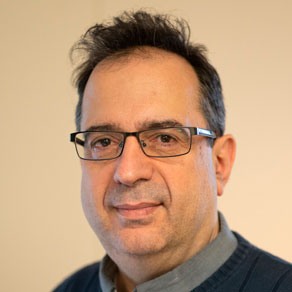Micromobility 2.0 Workshop
Smarter Strategies for Safe Travel


The Micromobility 2.0 Workshop was held on Friday, March 22, 2024. The Workshop bridged research and practice surrounding the use of micromobility devices (e-bikes, e-scooters, bicycles, etc.) and how best to address safety, infrastructure, and the use of innovative technology.
Workshop sessions covered:
- The state of the practice and emerging micromobility challenges in New Jersey
- How to use a Vision Zero lens to address safety for all road users
- Innovative technology related to data collection, analysis, prediction, and limitations
- Solutions to safety issues using social, infrastructure, and technological strategies

Workshop attendees included engineers, urban planners, public health professionals, innovative technology experts and scientists, micromobility companies, active transportation advocates, and local, regional, state, and federal policymakers.
The Micromobility 2.0 Workshop was hosted at the James Florio Special Events Forum at the Edward J. Bloustein School of Planning and Public Policy at Rutgers University, 33 Livingston Ave, New Brunswick, NJ.
Continuing maintenance credits are available for AICP-certified planners who attended the workshop. Click here for more information.
Up to three (3) PDH credits are available for professional engineers.
This workshop was funded through a grant provided by the National Science Foundation.
For more information, email: micromobility@ejb.rutgers.edu
Workshop Agenda
8:30am
Breakfast & Registration
Lobby
9:30am
Welcome & Opening Remarks
James Florio Special Events Forum
- Stuart Shapiro, PhD – Professor and Dean – Edward J. Bloustein School of Planning and Public Policy
- Jacob Kravetz, PhD – Science and Technology Policy Fellow – National Science Foundation
- Robert Noland, PhD – Director – Alan M. Voorhees Transportation Center
9:45am
Session 1
State of the Practice in Micromobility: Evolving Norms and Policies
The session delves into the dynamic landscape of micromobility, focusing on the users, data, policies, accessibility, inclusivity. As cities evolve, so do the norms and policies that shape their micromobility-friendly infrastructure such as bike lanes and parking. Learn about the potential for sustainable and efficient urban environments where connectivity and accessibility redefine the way we experience cities.
James Florio Special Events Forum
- Leigh Ann Von Hagen, AICP, PP (moderator) – Managing Director and Adjunct Professor – Alan M. Voorhees Transportation Center
- Irene Figueroa-Ortiz, AICP – Policy Advisor – New York City Department of Transportation
- Alex Keating – Head of Policy and Partnerships – Veo
- Simone Gore, AICP – Assistant Program Manager of Capital Programs – NJ TRANSIT
- Ralph Buehler, PhD – Professor, Urban Affairs and Planning – Virginia Tech
11:00am
Coffee Break
11:15am
Session 2
Toward a Safer Future: Innovation in Micromobility Safety
The U.S. Department of Transportation has put forward a vision for zero roadway deaths and is committed to addressing every aspect of crash risk through a Safe System Approach. Micromobility users are some of the most vulnerable road users and require accessible, sustainable, equitable solutions to ensure their safety. This session explores the role of micromobility in Zero Deaths Initiatives (Vision Zero, Toward Zero Deaths, and Road to Zero), with an emphasis on infrastructure, geometric design, and data.
James Florio Special Events Forum
- Bronwen Keiner (moderator) – Transportation Specialist – Federal Highway Administration
- Alan Huff – Safety Specialist – Federal Highway Administration
- Hannah Younes, PhD – Post-Doctoral Researcher – Alan M. Voorhees Transportation Center
- Eli Guseman, AICP – Senior Transportation Planner – City of Jersey City
12:30pm
Lunch
1:00pm
Session 3: Interactive Learning Labs and Posters
Navigating the Future: Unveiling the Impact of Emerging Technology on Active Transportation Safety and Inclusion
Innovative solutions are needed to ensure a more sustainable, safer, and equitable future. Workshop attendees are encouraged to explore three (3) Learning Labs that highlight recent advances in technology surrounding micromobility research. Hands on demonstrations, including virtual reality, biometric sensors, eye-tracking glasses, and LiDAR will be featured. In addition, explore poster presentations that show how research is shaping the future of urban planning, engineering, and computer science.
Room 369A: Virtual Reality Demonstration
- Chelsea Duan – Research Assistant
- Shengyuan Feng – PhD Student, Engineering
Room 369B: LiDAR, Sidewalks and Urban Heat Island
- Jie Gong, PhD – Associate Professor – Rutgers School of Engineering, Department of Civil and Environmental Engineering
Room 369B: Computer Vision
- Jiahao Xia – PhD Candidate, Civil Engineering
Rooms 369A & 369B
Room 253: Use of AI in Rebalancing and Charging of Shared Micromobility
- Yu Yang – Assistant Professor – Department of Computer Science and Engineering, Lehigh University
Room 253: App Development: Predicting Actions when Riding Micromobility Vehicles
- Yuequn Zhang – PhD Candidate, Computer Science
Room 261: Trajectories Prediction
- Dimitris Metaxas, PhD – Distinguished Professor – Rutgers School of Arts and Science, Department of Computer Science; Director – Center for Computational Biomedicine, Imaging and Modeling (CBIM)
- Song Wen – PhD Candidate, Computer Science
Rooms 253 & 261
Room 113: Biometric Sensors: Eye Tracking Glasses and Galvanic Skin Response
- Wenwen Zhang, PhD – Associate Professor – Edward J. Bloustein School of Planning and Public Policy, Rutgers University
- Shiyu Ma – PhD Student
Room 113
- Addressing the First and Last Mile Challenge: Innovative Solutions and Case Study Analysis in Camden City, New Jersey
Ruqaya Alfaris – Rowan University - Investigation of Young Pedestrian Crashes in School Districts of New Jersey Using Machine Learning Models
Arifuzzaman Nayeem – Rowan University - Eye Tracking Measures of Bicyclists’ Behavior and Perception: a Systematic Review
Shiyu Ma – Rutgers University - Findings from Traffic Camera Footage in Asbury Park, New Jersey
Hannah Younes, Ph.D. – Rutgers University - Multimodal Mobility Feasability Study in Jersey City, New Jersey
Colin Roche – Rutgers University - Human Behavior-Aware Rebalancing and Charging for Shared Micromobility Vehicles
Heng Tan – Lehigh University - Delveloping a Micromobility Guide for New Jersey
Sam Rosenthal & Greg Woltman – Rutgers University - Piloting an E-bike Rebate Program in Bridgeton, New Jersey
Jacob Thompson – Rutgers University - Implementing a Micromobility Demonstration Project in Asbury Park, New Jersey
Monika Pal – Cambridge Systematics - Powering Bikeshare in New York City: Does the Usage of E-Bikes Differ from Regular Bikes?
Ningning Xie, Ph.D. – Rutgers University - Micromobility and Youth Education, Engagement & Awareness in Safe Routes to School Programs
Sean Meehan & Jon Dugan – Rutgers University - Predicting Trajectories
Song Wen – Rutgers University
Lobby
2:20pm
Session 4: Moderated Discussion
From Lab to Streets: Exploring the Applicability of Emerging Technology for Micromobility Safety
Emerging technology can be used as a tool to improve safety, equity, and inclusion in transportation. But what practical role does it play in our society? Take your experience from the Workshop Learning Labs and join the discussion. This session will reveal the potential of emerging technology and its role in policy and infrastructure. Strengths and shortcomings of each technology, including who bears the risks and potential unintended consequences will be discussed, including their applicability for experimentation beyond laboratory settings.
James Florio Special Events Forum
- Clinton Andrews, PhD (moderator) – Professor and Associate Dean for Research – Edward J. Bloustein School of Planning and Public Policy, Rutgers University; Director – Center for Urban Policy Research
- Wenwen Zhang, PhD – Associate Professor – Edward J. Bloustein School of Planning and Public Policy, Rutgers University
- Jie Gong, PhD – Associate Professor – Rutgers School of Engineering, Department of Civil and Environmental Engineering
- Dimitris Metaxas, PhD – Distinguished Professor – Rutgers School of Arts and Science, Department of Computer Science; Director – Center for Computational Biomedicine, Imaging and Modeling (CBIM)
- Jiahao Xia – PhD Student, Civil Engineering – Department of Engineering, Rutgers University
3:20pm
Closing Remarks & Adjournment
James Florio Special Events Forum
- Clinton Andrews, PhD – Professor and Associate Dean for Research – Edward J. Bloustein School of Planning and Public Policy, Rutgers University; Director – Center for Urban Policy Research
3:30pm
End
Leigh Ann Von Hagen, AICP, PP

Leigh Ann Von Hagen is a Managing Director and Adjunct Professor with the Voorhees Transportation Center at the Bloustein School of Planning and Public Policy at Rutgers University. As a licensed professional planner, Leigh Ann has over 20 years of experience in transportation and land use planning, specializing in creating healthy, active communities for all ages and abilities through design, research, education, and training. Leigh Ann is currently the managing director for the NJ Department of Transportation’s Safe Routes and Bicycle and Pedestrian Resource Centers and conducts research and training on Health Impact Assessment and health in all policies.
Simone Gore, AICP

Simone J. Gore, AICP, is a proud alumna of the Bloustein School’s Planning Program (MCRP ’14). Currently, Simone is a Manager of Project Development at NJ TRANSIT where she works on bicycle and pedestrian access to transit projects. She has previously worked as a transportation demand forecaster for NJ TRANSIT and in the Transit Friendly Land Use unit. Before becoming a planner, Simone worked in social work research. She graduated magna cum laude from Barnard (2009) with a degree in Urban Studies and summa cum laude from the Albert A. List College with a degree in Jewish Gender Studies (2009). She enjoys cooking, baking, hiking, reading, traveling, and fiber arts.
Hannah Younes, PhD

Dr. Hannah Younes is a Post Doctoral Research Associate in the Edward J. Bloustein School of Planning and Public Policy, Rutgers University. Her research interests revolve around sustainable transportation and promoting equity. In her role at Rutgers University, Dr. Younes is focusing on accident detection from micromobility, the impact of the COVID-19 pandemic on everyday behavior, and on reducing vulnerability to crashes in New Jersey. Prior to her work as a post-doc, she was a research assistant for the Maryland Transportation Institute (MTI) in the Department of Civil and Environmental Engineering at UMD, focusing on transport geography issues. Some of her projects involved analyzing the role of the built environment in bike share ridership, the role of transit disruptions on a bike sharing system, and how vulnerable populations respond to evacuation orders during a hurricane. Her dissertation explored the potential of micromobility.
Alan Huff

Alan Huff is the Safety Specialist for the Federal Highway Administration’s New Jersey Division (FHWA-NJ). Alan oversees the Highway Safety Improvement Program (HSIP) and the Rail Highway Crossing Program (RHCP) through partnership with the New Jersey Department of Transportation. Alan serves as a resource to support the advancement of a Safe System in New Jersey that is complete and serves users equitably.
Alan worked for the South Jersey Transportation Planning Organization (SJTPO) for over 12 years, including as the Program Manager for Safety Initiatives and Public Outreach. During that time, Alan led the development of SJTPO’s award-winning Cumberland County Bicycle and Pedestrian Safety Action Plan and put in motion the development of four Countywide Local Road Safety Plans. In addition to his work with SJTPO, Alan has worked with MPOs in Nebraska, Iowa, Massachusetts, and Tennessee. Alan holds a Bachelor of Science in Community and Regional Planning from Iowa State University and a Master of City and Regional Planning from Rutgers University.
Clinton J. Andrews, Ph.D.

Clinton J. Andrews is a professor, center director, and the associate dean for research at the Edward J. Bloustein School of Planning and Public Policy, Rutgers University. He was educated at Brown and MIT in engineering and planning, and he worked previously in the private sector and at Princeton University. He teaches urban planning and public informatics courses, and he performs research on how people use the built environment. His work addresses climate change mitigation and adaptation, and how technological changes affect urban life. He has current projects on the energy transition, fiscal impacts of coastal hazards, and how low-income urban seniors cope with heat stress and poor indoor air quality. He publishes both scholarly and popular articles and his books include Humble Analysis: The Practice of Joint Fact-finding, Regulating Regional Power Systems, and Industrial Ecology and Global Change. He recently completed service as co-editor of the Journal of Planning Education and Research, and he remains a member of the editorial board of the Journal of Industrial Ecology. He is a member of the American Institute of Certified Planners and a licensed Professional Engineer. Andrews is a Fellow of AAAS, and a winner of IEEE’s 3rd Millennium Medal.
Wenwen Zhang, Ph.D.

Wenwen Zhang, Ph.D. joined the Bloustein School in August 2020. She received her Ph.D. from Georgia Tech’s School of City and Regional Planning in 2017. She also earned Masters in City and Regional Planning, Civil Engineering, and Computational Science & Engineering from Georgia Tech. Previously, she was a research assistant at the Center for Spatial Planning Analytics and Visualization (previously known as CGIS) for six years and an assistant professor of Urban Affairs and Planning at Virginia Tech for three years. Her research focuses on the social and policy impacts of emerging transportation technologies, such as automated vehicles, ride-hailing services, and micro-mobility, and leveraging data science and visualization techniques to address critical urban planning issues. She has published 16 journal articles, 15 conference proceedings, and one book chapter. She has served as a guest editor for Transportation Research Part D: Transport and Environment.
Alex Keating

Alexander Keating has extensive work experience in policy and partnerships roles within various organizations. Alexander was most recently the Head of Policy and Partnerships at Veo since April 2020. Prior to that, they served as the Senior Government Partnerships Manager at Getaround from May 2019 to April 2020.
Before their role at Getaround, Alexander worked at the New York City Department of Transportation, starting as a Senior Project Manager from January 2014 to December 2015. Alexander then progressed to the position of Director of Special Projects from January 2016 to May 2019.
Alexander’s early career included working as a Project Manager for Global Initiatives at the Penn Institute for Urban Research (Penn IUR) from an unspecified start date until January 2014.
Overall, Alexander Keating has a diverse background in policy, partnerships, and project management across multiple industries and organizations.
Alexander Keating’s education history includes studying at the Massachusetts Institute of Technology, where they obtained a Master of City Planning degree. During their time at MIT, they specialized in Urban Studies and Planning, focusing on the International Development Group as well as Urban Design and Regional Planning. Before that, Keating attended The University of Edinburgh, where they pursued a Bachelor of Arts degree in Politics.
Dimitris N. Metaxas, Ph.D.

Dr. Dimitris Metaxas is a Distinguished Professor in the Department of Computer Science at Rutgers University since July 2007. From September 2001 to June 2007 he was a Professor in the same department. He is currently directing the Center for Computational Biomedicine, Imaging and Modeling (CBIM). From January 1998 to September 2001 he was a tenured Associate Professor in the Computer and Information Science Department of the University of Pennsylvania and Director of the VAST Lab. Prior to this he was an Assistant Professor in the same department since 1992. Prof. Metaxas received a Diploma in Electrical Engineering from the National Technical University of Athens of Athens Greece in 1986, an M.Sc. in Computer Science from the University of Maryland, College Park in 1988, and a Ph.D. in Computer Science from the University of Toronto, Ontario, Canada in 1992.
Dr. Metaxas has been conducting research towards the development of formal methods upon which both computer vision, computer graphics and medical imaging can advance synergistically. In computer vision, he works on the simultaneous segmentation and fitting of complex objects, shape representation, statistical model-based tracking, learning, sparsity, ASL and gesture recognition. In particular he is focusing on human body and shape motion analysis, human surveillance, security applications, ASL recognition, behavior modeling and analysis and scalable solutions to large and distributed sensor-based networks. In the area of biomedical applications new methods have been developed for material modeling and shape estimation of internal body parts (e.g., lungs) from MRI, SPAMM and CT data, a pioneering framework for linking the anatomical and physiological models of the human body and deformable models suitable for the automatic diagnosis of heart illness from MRI data. In computer graphics, he introduced the Navier-Stokes methodology for Fluids, based on which the water scenes in the movie ”Antz” were created in 1998. For this work, his student Nick Foster won a Technical Acheivement award from the Academy of Motion Picture Arts and Sciences in 1999. Since then, he is working on new techniques for modeling fluid phenomena, and control theoretic techniques for automating and improving the animation of articulated (e.g., humans) objects. Dr. Metaxas has published over 500 research articles (see google scholar) in these areas and has graduated 42 PhD students. The above research has been funded by NSF, NIH, ONR, AFOSR, DHS, DARPA and the ARO.
Dr. Metaxas has published a book on his research activities titled ”Physics-based deformable models: Applications to computer vision, graphics and medical imaging” published by Kluwer Academic. He organized the first IEEE Workshop on Physics-Based Modeling in Computer Vision, he is on the Editorial Board of Medical Imaging, as Associate Editor of GMOD, and CAD and is a Co-Editor of the Special Issue of Computer Vision and Image Understanding on Physics-Based Modeling and Reasoning. Dr. Metaxas has received 7 patents and numerous best paper awards for his work on vision, medical imaging and fluid modeling. His student Junzhou Huang won a Young Scientist Award (best paper award) for his work on sparsity from MICCAI 2010 and his recent work on Histopathologic Image Analysis by his student Menglin Jiang and Shaoting Zhang won a best paper award at MICCAI 2015. Dr Metaxas was awarded a Fulbright Fellowship in 1986, is a recipient of an NSF Research Initiation and Career awards, an ONR YIP, is a Fellow of IEEE and a Fellow of the American Institute of Medical and Biological Engineers, and a member of ACM. He was also the Program Chair of ICCV 2007 (best Computer Vision Conference), a General Chair of ICCV 2011, and CVPR 2014, the General Chair of MICCAI 2008 (best Medical Imaging Conference) and the Senior Program Chair for SCA 2007. He has also organize dnumerous workshops in his areas or research.
Ralph Buehler, PhD

Ralph Buehler, PhD is Professor of Urban Affairs and Planning at Virginia Tech’s Research Center in Arlington, VA. Most of his research has an international comparative perspective, contrasting transport and land-use policies, transport systems, and travel behavior in Western Europe and North America. In addition to over 80 articles in refereed academic journals, Ralph is also the co-editor of the books City Cycling and Cycling for Sustainable Cities (both MIT Press). Between 2012 and 2018, he served as chair of the Committee for Bicycle Transportation of the Transportation Research Board (TRB), and between 2019 and 2023 Ralph chaired the Urban Affairs and Planning program at Virginia Tech.
Eli Guseman, AICP

Elias Guseman is a Senior Transportation Planner for the City of Jersey City. In his 5 years with Jersey City, he has managed the development of short- and long-range planning studies, overseen the rollout of the first city-wide protected bike parking network in the country and helped manage the City’s highly successful microtransit and bike share programs. As a passionate advocate of active transportation, Elias has also been involved in Jersey City’s Vision Zero efforts and installation of over 20 miles of protected bike lanes. Elias earned a B.S. in Urban Planning and Design and Master of City and Regional Planning from Rutgers University.
Irene Figueroa-Ortiz, AICP

Irene Figueroa-Ortiz, AICP is a Policy Advisor at the Office of the Commissioner of the NYC Department of Transportation (DOT), where she oversees micro and shared mobility policy initiatives. Irene’s recent work focuses on emerging micromobility topics such as battery charging for e-bikes and the changing street access demands brought by the mode shift of delivery services to micromobility devices. Before her current role, Irene worked as a Senior Project Manager at DOT’s Public Space Unit, where she oversaw the implementation of pedestrian-priority projects in NYC such as plazas and shared streets.
Irene earned a dual master’s degree in architecture and urban planning with Distinction from the Harvard University Graduate School of Design and a bachelor’s degree in environmental design from the University of Puerto Rico. Between 2016 and 2019, she was an Enterprise Rose Architectural Fellow.
Stuart Shapiro, PhD

Stuart Shapiro was named Dean, Edward J. Bloustein School of Planning and Public Policy, in April 2022. He joined Rutgers University in 2003. Prior to that, he received a PhD in Public Policy from Harvard University – Kennedy School of Government and worked at the Office of Management and Budget under Presidents Clinton and George W. Bush.
Dr. Shapiro teaches classes in economics, public policy, and politics. He has written three books and published numerous articles in law reviews, political science journals, public administration journals, and several others. He writes op-eds for The Hill and occasionally other news sites and has been quoted in the popular press extensively.
Jacob Kravetz, PhD

Dr. Jacob Kravetz is a chemist and community organizer originally from Massachusetts. He received his undergraduate degree from Williams College and a PhD in chemistry from Johns Hopkins University. Dr. Kravetz is currently serving at the National Science Foundation (NSF) as a Science and Technology Policy Fellow from the American Association for the Advancement of Science. As a fellow he works primarily on the Smart and Connected Communities, and Civic Innovation Challenge programs, combining cutting edge research and community partnerships to discover the most effective methods for building sustainable, equitable, and resilient communities in the face of crisis.
Bronwen Keiner

Bronwen Keiner serves as a Transportation Specialist with the Federal Highway Administration’s (FHWA) Office of Human Environment. She leads the U.S. DOT Micromobility Working Group and supports the National Systems and Economic Development Team on a range of activities, including scenic byways, economic development, curbside management, mobility innovations, rural communities, and transit-oriented development. Before joining FHWA, Bronwen moved to the DC area from Los Angeles, CA where she worked for 16 years in transportation, community relations, and regional planning. She holds a Bachelor in Political Science from Stanford University and a Master of Public Administration from San Francisco State University.
Jie Gong, PhD

Dr. Jie Gong is an associate professor in the Department of Civil and Environmental Engineering at Rutgers University. His research focuses on quantifying and modeling the natural and built environments in particular for the most vulnerable communities so that we can understand and mitigate its vulnerabilities to natural and man-made extreme events as well as rapid technology and policy changes. He conducts research on two interrelated fronts: (1) optimization and deployment of remote sensing systems for disaster response, design and development of cyberinfrastructure to support hazard analysis and modeling, and modeling of natural and manmade disaster impacts to urban communities; (2) quantifying and mitigating stressors in urban societies through simulations and smart city solutions, in particular related to mobility of disabled populations and well-being of distressed communities.
Jiahao Xia

Jiahao Xia is a PhD candidate in Civil and Environmental Engineering at Rutgers University with a profound passion for harnessing the power of machine learning and computer vision to extract critical insights from point clouds and images. His primary focus lies in bolstering the resilience of vulnerable communities in the face of natural hazards, particularly floods and hurricanes. Additionally, he is deeply invested in improving accessibility for individuals with travel-limiting disabilities through the automated development of pedestrian infrastructure inventory using multi-mode geospatial data.
Yu Yang

Song Wen

Shiyu Ma

Chelsea Duan

Shengyuan Feng

Robert Noland, PhD

Yuequn Zhang
